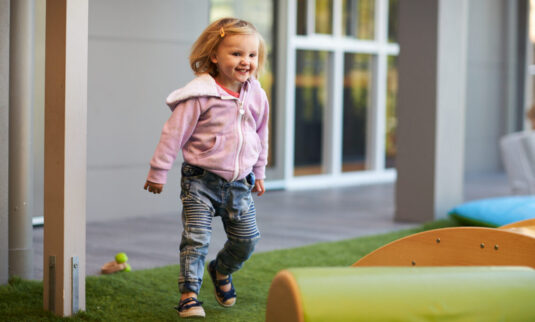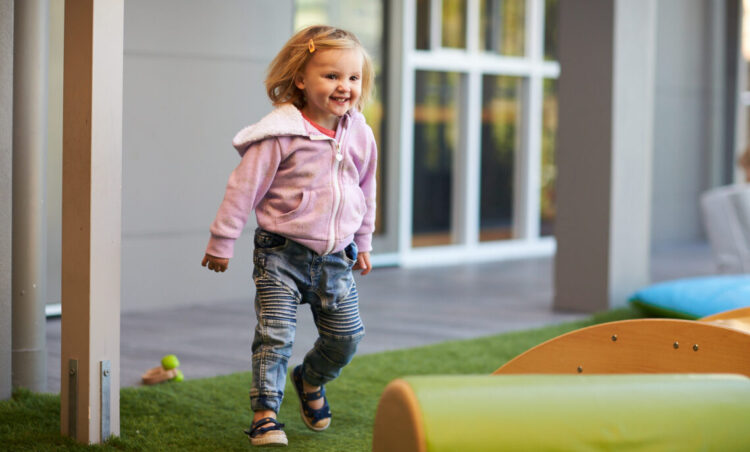Respectful Nappy Changes


The most significant thing about a nappy change is not the new nappy. It’s the good feelings shared between baby and parent. It’s the relationship. How can you slow down your nappy changes and give them your full attention?
At Only About Children our in-house Curriculum Business Partner, Jenny Kable, explains that nappy changes are not just another routine caregiving task to rush through so that you get to the more important parts of the day. They are valued as important opportunities for learning and relationship building.
Why should we slow down nappy changes?
There are several benefits for both baby and the parent for slowing down during nappy changes:
- It allows the parent to be more attentive and gentle while changing the nappy, which can help build a stronger bond between the parent and the baby.
- It can prevent accidents such as dropping the baby or hurting them while changing their nappy.
- It can help the baby feel more comfortable and relaxed during the process, which can make them less fussy and more coorperative.
- It can help prevent nappy rash by allowing the parent to clean and dry the baby’s skin more thoroughly.
Tips for slowing down nappy changes
Nappy changes with toddlers can be tough for both the parent and toddler! Here are some ideas, inspired by Janet Lansbury with How To Love A Diaper Change , to help support a more mindful and respectful experience for babies and toddlers:
- A respectful start – toddlers don’t like to be interrupted when they are playing, wait for a gap in their playing before starting the nappy changing process. You may wish to give your toddler some autonomy and ask “Would you like to walk to the change table or should I carry you?”
- Give the undivided attention your toddler loves – slow down and focus on your little ones for these few minutes. Toddlers sense our hurry or distraction, and it can make them tense and resistant. Ask for your baby’s help, talk them through what you are doing and encourage the use of senses (the feel of the cold wipe, the sound of the zip in their pyjamas).
- Be open minded – when toddlers become mobile, nappy changing may look quite different! Continue to ask for cooperation but understand that your toddler may wish to now stand for their nappy change. Also encourage their independence, you may ask him to take off his own nappy or wipe himself. You may be surprised by all that your toddler can do!
What happens when your toddler is distressed when changing their nappy?
It will not always be easy. Acknowledge that sometimes nappy changes can be disastrous, embrace it and share your feelings with your toddler, “Wow, that was a tough one for both of us, wasn’t it?”
The following tactics can also help make nappy changes smoother for both you and your toddler.
- Prep the area: Before you change your baby, it helps to have everything you need ready. Create a comfortable, ready space for the change.
- Explain gently: Use simple words to explain the process and why it’s needed.
- Positive reinforcement: Praise their cooperation.
- Stay calm: Keep your own calm demeanor to ease their distress.
- Empathise: Acknowledge their feelings and reassure them.
Learn more tips & tricks from our in-house Curriculum Business Partner, Jenny Kable: 5 Things To Say Instead Of Don’t Cry
Plus, read more on this topic from Janet Lansbury with How To Love A Diaper Change or from Ruth Anne Hammond in her insightful book, Respecting Babies: A New Look At Magda Gerber’s RIE Approach.
Only About Children can help your child to grow, make friends and explore the world.
Only About Children can help your child to grow, make friends and explore the world.
Related Reads


Talking To Young Children After Traumatic Events
Discussing traumatic events with children is crucial for helping them understand and accept what's happening in their world.

MasterChef Tommy Pham's Coconut Turmeric Chicken With Rice & Greens
MasterChef Tommy Pham has teamed up with our Dietitians Anna & Alex to create a delicious and nutritious lunch option for children to enjoy in campus - Tommy's Coconut Turmeric Chicken/Chickpea with Rice & Greens. Campus cooks will be preparing Tommy's lunch recipe as part of our delicious, rotating Autumn Menu in campuses. Sound delish? Try the recipe at home!
